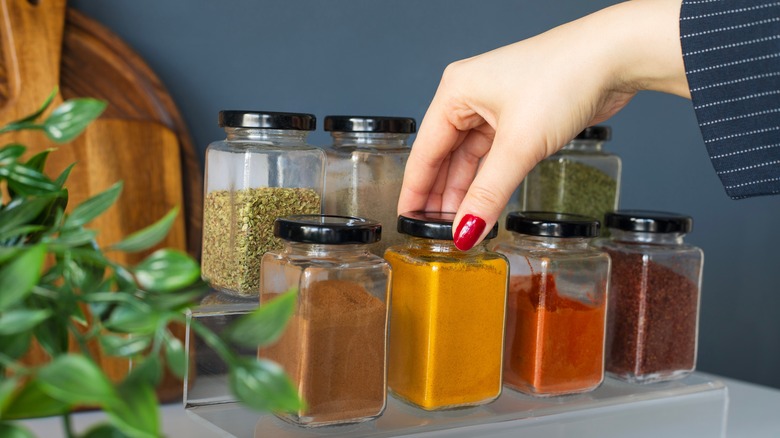You're Probably Storing Your Spices Wrong, According To Alton Brown
If you want to make food with flavor, you'd better have a well-stocked spice rack. A few shakes of cumin or smoked paprika can be one of many game-changing ingredients for guacamole, and sumac can transform desserts, so it's important to always work with fresh spices that have the maximum flavor. And if you're still storing your spices in those clear jars, Alton Brown says you're doing it all wrong.
"Herbs and spices have a lot of volatile compounds," he said of the flavors and aromas in spices in a YouTube video posted by the Food Network. "Volatile" means that these aromatic qualities can easily go away if they're not in the right conditions, he explained, including exposing them to light, heat, and air. Volatile organic compounds, known as VOCs, are responsible for the scent (and therefore taste) unique to each spice. For example, gingerol is the VOC that gives ginger its punch while pepper gets its spiciness from piperine. Without potent VOCs, your spices will be lackluster at best.
To combat the forces working to spoil spices, Brown prefers to store his seasonings in small, windowless metal canisters in a room-temperature cabinet. "I buy these at a hobby shop or a craft shop," he said, adding, "They're not really airtight, but they certainly prevent air from getting to them."
Spices don't last forever
Another big mistake people often make when storing spices is letting them hang around too long. Just because they're dried doesn't mean they don't have a shelf life. "Herbs and spices do not last forever," said Alton Brown in the same video. "You can prolong their life with proper storage, but in the end I still change out everything every six months."
When you bring new jars of spices into your kitchen, even if you don't decant them into metal tins like Brown's, it's still a good idea to write the date on the lid of the jar with a permanent marker. That way you'll know exactly how long that jar of za'atar seasoning, which is a blend of spices, has been hanging around.
Most chefs, like Brown, replace their spices every six months (if they don't use them up by then) because their livelihood depends on it, but realistically at home, you should aim to replace your spices sometime between one to two years. After that, those volatile aromatic flavors will be way past their prime, and you'll be much better off starting fresh. If you're not sure how old your current spices are, that's a sure sign that they need to be replaced!


